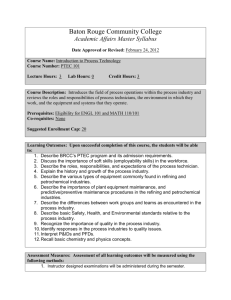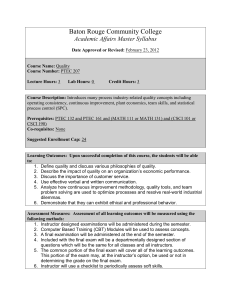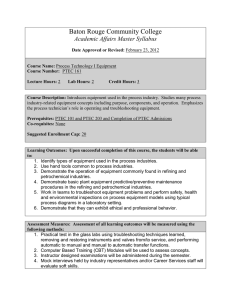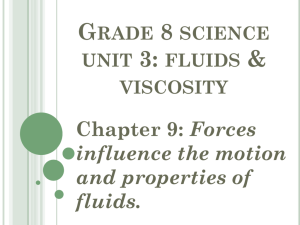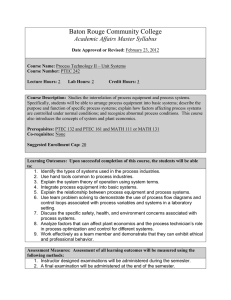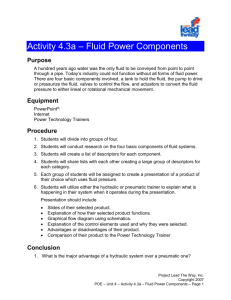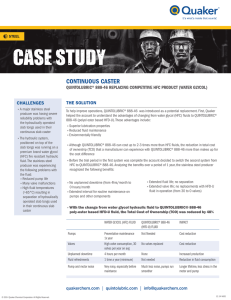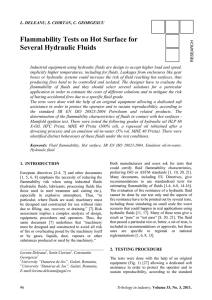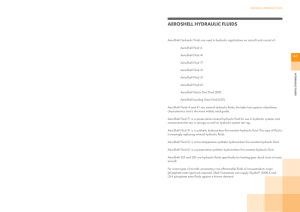Baton Rouge Community College Academic Affairs Master Syllabus
advertisement
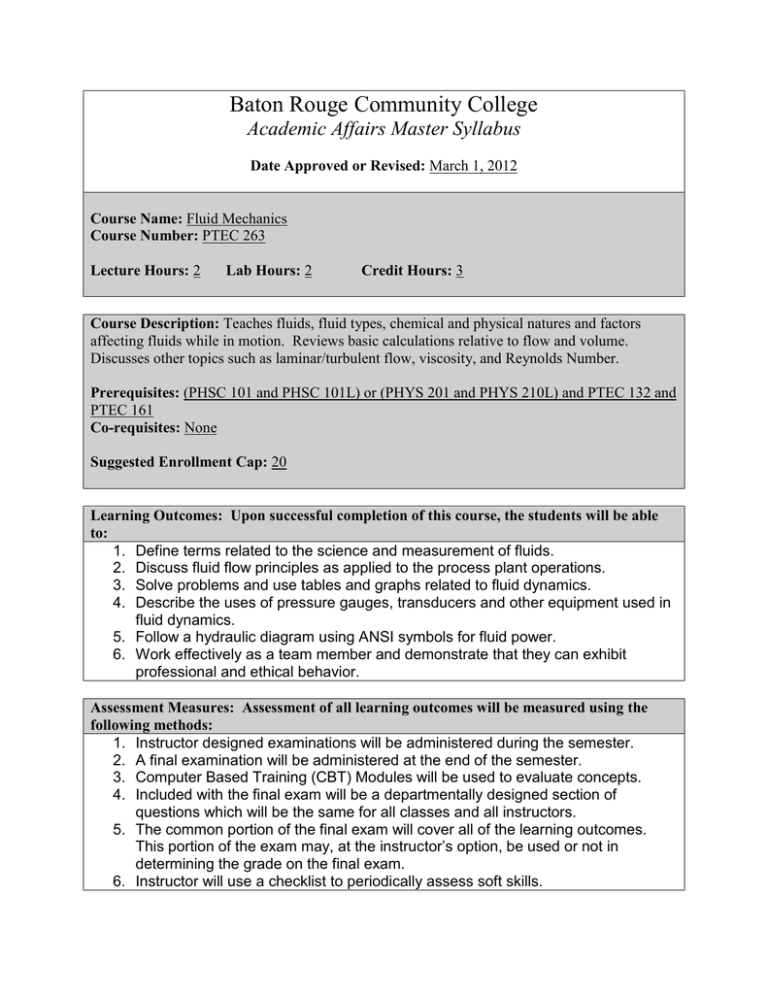
Baton Rouge Community College Academic Affairs Master Syllabus Date Approved or Revised: March 1, 2012 Course Name: Fluid Mechanics Course Number: PTEC 263 Lecture Hours: 2 Lab Hours: 2 Credit Hours: 3 Course Description: Teaches fluids, fluid types, chemical and physical natures and factors affecting fluids while in motion. Reviews basic calculations relative to flow and volume. Discusses other topics such as laminar/turbulent flow, viscosity, and Reynolds Number. Prerequisites: (PHSC 101 and PHSC 101L) or (PHYS 201 and PHYS 210L) and PTEC 132 and PTEC 161 Co-requisites: None Suggested Enrollment Cap: 20 Learning Outcomes: Upon successful completion of this course, the students will be able to: 1. Define terms related to the science and measurement of fluids. 2. Discuss fluid flow principles as applied to the process plant operations. 3. Solve problems and use tables and graphs related to fluid dynamics. 4. Describe the uses of pressure gauges, transducers and other equipment used in fluid dynamics. 5. Follow a hydraulic diagram using ANSI symbols for fluid power. 6. Work effectively as a team member and demonstrate that they can exhibit professional and ethical behavior. Assessment Measures: Assessment of all learning outcomes will be measured using the following methods: 1. Instructor designed examinations will be administered during the semester. 2. A final examination will be administered at the end of the semester. 3. Computer Based Training (CBT) Modules will be used to evaluate concepts. 4. Included with the final exam will be a departmentally designed section of questions which will be the same for all classes and all instructors. 5. The common portion of the final exam will cover all of the learning outcomes. This portion of the exam may, at the instructor’s option, be used or not in determining the grade on the final exam. 6. Instructor will use a checklist to periodically assess soft skills. Information to be included on the Instructor’s Course Syllabi: Disability Statement: Baton Rouge Community College seeks to meet the needs of its students in many ways. See the Office of Disability Services to receive suggestions for disability statements that should be included in each syllabus. Grading: The College grading policy should be included in the course syllabus. Any special practices should also go here. This should include the instructor’s and/or the department’s policy for make-up work. For example in a speech course, “Speeches not given on due date will receive no grade higher than a sixty” or “Make-up work will not be accepted after the last day of class.” Attendance Policy: Include the overall attendance policy of the college. Instructors may want to add additional information in individual syllabi to meet the needs of their courses. General Policies: Instructors’ policy on the use of things such as beepers and cell phones and/or hand held programmable calculators should be covered in this section. Cheating and Plagiarism: This must be included in all syllabi and should include the penalties for incidents in a given class. Students should have a clear idea of what constitutes cheating in a given course. Safety Concerns: In some programs this may be a major issue. For example, “No student will be allowed in the safety lab without safety glasses.” General statements such as, “Items that may be harmful to one’s self or others should not be brought to class.” Library/ Learning Resources: Since the development of the total person is part of our mission, assignments in the library and/or the Learning Resources Center should be included to assist students in enhancing skills and in using resources. Students should be encouraged to use the library for reading enjoyment as part of lifelong learning. Expanded Course Outline: I. II. III. Introduction to Fluid Mechanics Review of Basic Chemistry and Physics Principle (applied to gases and liquids) Introduction to Fluid Power (hydraulics and pneumatics) IV. V. VI. VII. VIII. IX. X. XI. XII. Introduction to Fluid Mechanics Review of Basic Chemistry and Physics Principle (applied to gases and liquids) Introduction to Fluid Power (hydraulics and pneumatics) Physical properties of Fluids (liquids and gases) Energy and Power in Hydraulic Systems Frictional Losses in Pipelines Pumps Hydraulic Cylinders, Motors, and Valves Hydraulic Symbols and Reading Hydraulic Diagrams
